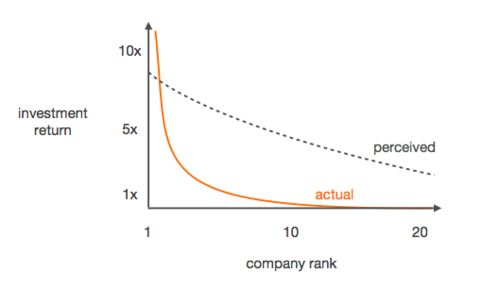They're also getting involved in the Venture Capital frenzy, investing in early-stage cloud companies.
In all seriousness though, the idea of VC has been going around the blogosphere a lot. Peter Thiel gave a talk about how VC funds work. And showed this graph:
The basic principle is that for a VC fund, there are maybe one or two projects that actually make gains. A vast majority of the projects that are invested in tend to fail. . . I hope that this is something that VC managers (cough Winklevoss Twins cough) realize. Because it plays a big part in how the VC market works.
Particularly, I wanted to point out Noah Smith's post about a slump in VC returns since the burst of the Dot-com bubble. He references a paper that shows this graph:
The different lines are different data sets showing how well VC funds did relative to Private Market Equivalence (or how well the U.S. public stocks did in general). A PME of greater than 1 means that the VC investment did better than public stocks. If VC's fell below 1, then investors would for sure leave the market.
As you can see, we're in kind of a VC slump. Where gains haven't reached anywhere near the levels reached in the mid-1990s. Of course, there could be a number of reasons why that is.
Maybe the VC fund's of the 1990s got all the low-hanging fruit. That doesn't really seem to surprise me. There really hasn't been any HUGE payoffs from the internet apart from what we already have. Yes, we have social networks, but are they really driving that much economic value other than advertisements? It seems to me that Venture Capital does well when there are big breakthroughs in a certain industry, and there's a vacuum with how to apply those discoveries. In fact, in 2011, less than 30% of VC funds went to software and media industries, and more are going towards energy and biotechnologies. These are trends that I'm glad to see - considering payoffs might actually improve living standards a good deal. It'd be interesting to see what Tyler Cowen thinks in relation to his Great Stagnation theory.
But overall, I think the problem is that we haven't found some breakthrough way to apply big data or cloud computing. Hopefully these investments will help spur some of those discoveries...


No comments:
Post a Comment